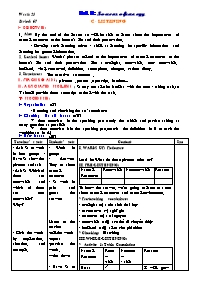Bài soạn môn học Tiếng Anh 11 - Period 67 - Unit 11: Sources of energy - C: Listening

I- OBJECTIVES:
1. Aim: By the end of the lesson sts will be able to listen about the importances of natural resources to the human's life and their preservation.
- Develop such listening micro - skills as listening for specific information and listening for general information.
2. Lexical items: Words/ phrases related to the importances of natural resources to the human's life and their preservation like : ecologist, renewable, non- renewable, fertilized, vital, conserved, definition, atmosphere, nitrogen, carbon dioxy,
3. Structures: The narrative statements .
II. TEACHING AIDS: p ictures , posters ,tapescript, handout
III. ANTICIPATED PROBLEMS: Ss may not also be familiar with the note - taking task,so T should provide them some tips to deal with the task.
V- PROCEDURES:
1- Organization:(2)
- Greeting and checking the sts attendance
2- Checking the old lesson:(10')
* does exercise in the speaking part (study the tabble and pactise asking as many question as possible
* does exercise 3 in the speaking part.(match the definition in B to each the
Week: 23 Unit 11 : Sources of energy Period: 67 c- listening I- objectives: 1. Aim: By the end of the lesson sts will be able to listen about the importances of natural resources to the human's life and their preservation. - Develop such listening micro - skills as listening for specific information and listening for general information. 2. Lexical items: Words/ phrases related to the importances of natural resources to the human's life and their preservation like : ecologist, renewable, non- renewable, fertilized, vital, conserved, definition, atmosphere, nitrogen, carbon dioxy, 3. Structures: The narrative statements . II. Teaching aids: p ictures , posters ,tapescript, handout III. Anticipated problems: Ss may not also be familiar with the note - taking task,so T should provide them some tips to deal with the task. V- Procedures: 1- Organization:(2’) - Greeting and checking the sts’ attendance 2- Checking the old lesson:(10') * does exercise in the speaking part (study the tabble and pactise asking as many question as possible * does exercise 3 in the speaking part.(match the definition in B to each the word/phrase in A) 3- New lesson (30’) Teacher’ s acts Students’ acts Content Sup - Ask Ss to work in four groups - Have Ss show the pictures and ask - Ask Ss Which of them are renewable and which of them are non renewable? Why? - Elicit the words by explanation, situation, and example. - Ask Ss to listen and check their guessing - Let them compare their answers. - Check the answers with the class. - Ask Ss to read task 1 page 129 carefully, guess the answer. - Ask Ss to listen to the tape again and fill in the gaps with the words they have heard. - Ask Ss to work in groups of five to discuss the questions. - Work in groups - Answer: They re about natural resources - Ss work in pairs and guess the answers Listen to the teacher -tell the words -repeat -practise the words. -write down - Have Ss to listen to the recording twice. At the first time, ask Ss to list all the resources they hear. AT the second time Ss tick which resources is renewable and which is nonrenewable. - Read task 1 page 129 carefully, guess the answer. - Listen to the tape again and fill in the gaps with the words -Work in groups of five to discuss the questions. I. WARM UP: Pictionary Lead in: What do these pictures refer to? II. PRE-LISTENING: Natural Resources Renewable Nonrenewable Reasons To know the answer, we’re going to listen to a text about natural resources and natural environment. * Pre-teaching vocabulary: - ecologist (n) : nhaứ sinh thaựi hoùc - to conserve (v) : giửừ gỡn - resources (n) : taứi nguyeõn - removable (adj) : coự theồ di chuyeồn ủửụùc - fertilized (adj) : laứm cho phỡ nhieõu * Checking: Matching III. WHILE-LISTENING: * Activity 1: Table Completion Natural Resoures Renew -able Nonrenew - able Reasons Grass Coal Fossil fuels Solar energy Air Water ỹ ỹ ỹ ỹ ỹ ỹ It will grow quickly It takes many of years of coal Unlimited Unlimited * Activity 2: Multiple Choice Listen to the tape and circle the word they choose 1-D 2-C 3-D 4-A 5-B * Activity 3: Gap-Fill 1.unlimited 2.atmosphere 3.may 4.gases 5.amounts IV. POST-LISTENING: -What can we do to keep the resources renewable? - What should we do to protect our environment? V. HOMEWORK: Learn the new words by heart Prepare the next part
Tài liệu đính kèm:
 Av11(T67).doc
Av11(T67).doc





